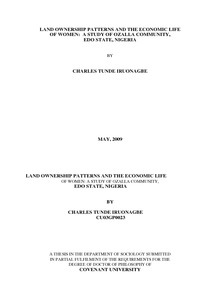Iruonagbe, C. T.
(2009)
LAND OWNERSHIP PATTERNS AND THE ECONOMIC LIFE
OF WOMEN: A STUDY OF OZALLA COMMUNITY,
EDO STATE, NIGERIA.
PhD thesis, Covenant University.
![[img]](http://eprints.covenantuniversity.edu.ng/26/2.hassmallThumbnailVersion/Research_Project_Cover_Page_And_List_of_Tables.pdf)  Preview |
|
PDF (Word to PDF conversion (via antiword) conversion from application/msword to application/pdf)
- Submitted Version
Download (39Kb)
| Preview
|
Abstract
This study was carried out in Ozalla community, Edo State, Nigeria, which is an area that is rural and agrarian and where the level of literacy is quite low. It focused on the challenges faced by women in their quest for land, including the difference between access to land and ownership of land and how this affects the economic life of rural women. The theoretical framework centred on two related theories, namely the conflict theory and the African feminist theory.
A combination of methods was used in the study. It employed the survey method for the quantitative data as well as in-depth interviews and focus group discussions for the qualitative data. The area was stratified on the basis of quarters and 789 women were randomly selected for interview using systematic sampling technique. The qualitative method involved the use of eight in-depth interviews and two focus group discussions sessions.
Four hypotheses were tested. The results showed that women’s status to inherited land significantly determines the amount of food crops produced in acres. Also, women’s status to the land cultivated significantly determines the level of their income from farming for monthly expenses. However, women’s status to the land cultivated did not determine their access to credit facilities for farming. And, women’s status to inherited land significantly determines the decision on choice of crops to cultivate.
Results from the qualitative analyses, which corroborate the quantitative data, show that women in Ozalla community only have access to land but not ownership. Also, ownership of land did not affect how credit facilities were attained as both men and women did not benefit such from the government, development banks and micro finance banks or even from the local government. Men have control over land and other properties because women are usually not considered or consulted when issues of inheritance are discussed. In addition, women’s status to land determined the choice of crops to grow.
On the basis of these findings, it is recommended that, because of its retrogressive nature, gerontocratic rule should be gradually replaced by the prescribed model of kingship and succession rule that would guarantee a dynamic and progressive style of rulership in Ozalla community. Also, women should be considered in inheritance rights through modification of cultural practices guaranteed by adequate enforcement of the statutory law and review of the customary law in Ozalla community. In addition, government must be responsive to the plight of rural women, and family relations, especially a woman’s brothers or brothers of a deceased husband should be accommodating and understanding in handling women’s demands such as the need for land to farm.
Actions (login required)
 |
View Item |

